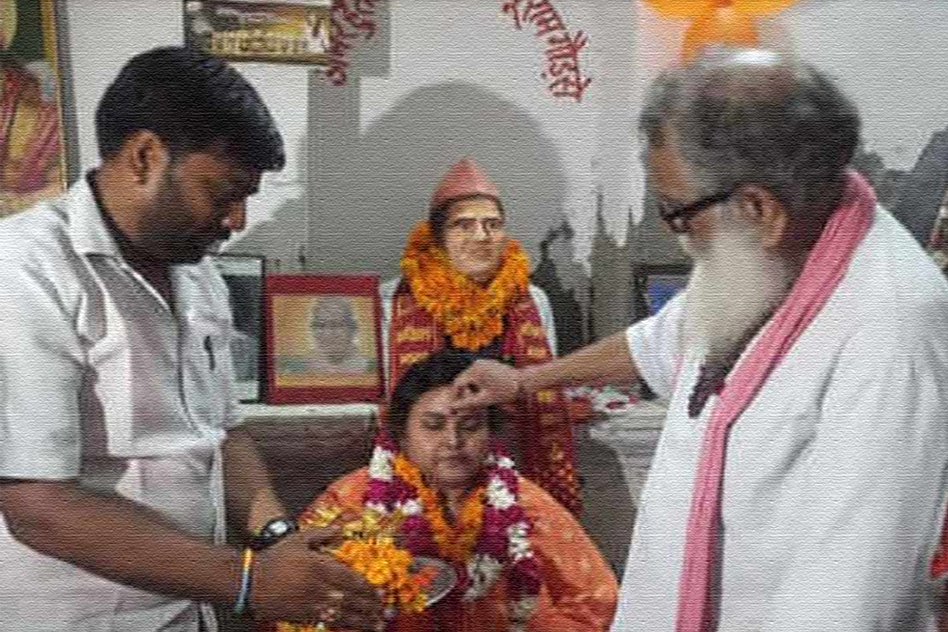
Hindu Mahasabha Sets Up India’s First 'Hindu Court', Says Can Give 'Death Sentence'
16 Aug 2018 7:52 AM GMT
While India celebrated its 72nd Independence Day, the Akhil Bharatiya Hindu Mahasabha set up the country’s first Hindu Court, which has been established along the lines of the Sharia Courts.
These Hindu Courts, much like the Darul-Qaza (Sharia Courts) which resolve affairs in line with Islamic Laws, are set to make decisions on Hindu matters. According to the Times Of India, in a ceremony held at the party office in Meerut’s Sharda Road, the first Hindu Court also received its first judge – Pooja Shakun Pandey who is also the national secretary of the Mahasabha.
Why is the Hindu court established?
“We had challenged the establishment of Sharia Courts a few days ago and asked that they should not exist at all because there should be one constitution for all. We had even asked the government in a letter that we sent demanding this, that if our demands are not met, we will set up a similar court for Hindus. Since no action was taken in our favour, we set up the first Hindu court here on Wednesday,” said Pandit Ashok Sharma, national vice president, Akhil Bharatiya Hindu Mahasabha to the daily.
What functions will it perform?
Reportedly, this court is going to deal with a wide range of issues like harassment of Hindu women, Hindu marriages, property or money disputes among others. Pooja Shakun Pandey also said that these courts will pave the way to bring Hindus closer, who have been divided along caste lines. Moreover, she said that while there will be provisions of jails, the maximum punishment that can be awarded will be death. Pandey was a professor until five years ago, and also holds multiple degrees in mathematics and computer science.
The Akhil Bhartiya Hindu Mahasabha is set to declare the bylaws of the Hindu courts on October 2 and appoint five judges across different locations in India on November 15. According to district president, Abhishek Agarwal, these Hindu courts will help people to get justice in an affordable manner.
What are Sharia Courts?
Sharia courts or Darul Qaza are institutions where Muslims can go to resolve or ask for mediation in cases related to marriage, divorce and inheritance, in accordance with the Islamic law. Darul Qaza or the Sharia courts have been in India for decades. It is to be noted that these court work under the arbitration act. Under the Indian laws, Darul Qaza finds no legal sanctity. Individuals have the freedom to approach civil or criminal court if the decision of these Sharia courts is deemed inadequate. These courts in no way are parallel to Indian courts.
Supreme Court in 2014, while giving its verdict on the Vishwa Lochan Madan case said that the Sharia courts have no legal sanction and hence their fatwa or diktat isn’t obligatory. Delhi-based advocate Vishwa Karma Madan had approached SC in 2005 where he brought a case to the court’s case. As per this case, a woman was asked by the Sharia court to leave her husband and children and live with her father-in-law who had raped her. The bench comprising Justice CK Prasad and Justice Pinaki Chandra Ghose observed that Islamic judges who decide on religious laws can only pass a verdict in cases where the individuals voluntarily submit them, the Livelaw had reported.
Supreme court also observed that it is a matter of faith for people to approach Sharia courts and a blanket ban on them is not possible.
Senior All India Muslim Personal Law Board (AIMPLB) member Senior Zafaryab Jilani told News18, “This is not a court. We call it Darul-Qaza where a Qazi sits and listens to people’s disputes. Both parties approach the Qazi and he tests them about Shariat. He tries to resolve their issue and if they agree they do not approach Civil Court. There is no conflict between Civil Courts and Darul-Qaza.”
The Logical Indian take
The concept of mediation by community elders is a long established tradition in India. However, the constitutional validity of these ‘courts’ limit them substantially so that they cannot infringe on an individual’s fundamental rights. Now, these ‘Hindu Courts’ are saying that they will have their own jails and they can even give a death sentence. Surely, their constitutional validity and this misguided attempt to ‘unite’ Hindus needs to be checked.
Also Read: Eminent Indian Citizens Give A Draft For Uniform Civil Code To Law Panel, Know About It
 All section
All section













